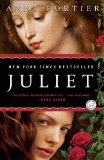Summary | Excerpt | Reading Guide | Reviews | Beyond the Book | Readalikes | Genres & Themes | Author Bio

Excerpt
Juliet
Alack, alack, what blood is this which stains
The stony entrance of this sepulchre?
It has taken me a while to figure out where to start. You could argue that my story began more than six hundred years ago, with a highway robbery in medieval Tuscany. Or, more recently, with a dance and a kiss at Castello Salimbeni, when my parents met for the first time. But I would never have come to know any of this without the event that changed my life overnight and forced me to travel to Italy in search of the past. That event was the death of my great-aunt Rose.
It took Umberto three days to find me and tell me the sad news. Considering my virtuosity in the art of disappearing, I am amazed he succeeded at all. But then, Umberto always had an uncanny ability to read my mind and predict my movements, and besides, there were only so many Shakespeare summer camps in Virginia.
How long he stood there, watching the theater performance from the back of the room, I do not know. I was backstage as always, too absorbed in the kids, their lines and props to notice anything else around me until the curtain fell. After the dress rehearsal that afternoon, someone had misplaced the vial of poison, and for lack of better, Romeo would have to commit suicide by eating Tic Tacs.
“But they give me heartburn!” the boy had complained, with all the accusatory anxiety of a fourteen-year-old.
“Excellent!” I had said, resisting a motherly urge to adjust the velvet hat on his head. “That’ll help you stay in character.”
Only when the lights came on afterwards, and the kids dragged me onstage to bombard me with gratitude, did I notice the familiar figure looming near the exit, contemplating me through the applause. Stern and statuesque in his dark suit and tie, Umberto stood out like a lone reed of civilization in a primordial swamp. He always had. For as long as I could remember, he had never worn a single piece of clothing that could be considered casual. Khaki shorts and golf shirts, to Umberto, were the garments of men who have no virtues left, not even shame.
Later, when the onslaught of grateful parents subsided and I could finally walk off the stage, I was stopped briefly by the program director, who took me by the shoulders and shook me heartily—he knew me too well to attempt a hug. “Good job with the youngsters, Julie!” he gushed. “I can count on you again next summer, can’t I?”
“Absolutely,” I lied, walking on. “I’ll be around.”
Approaching Umberto at last, I looked in vain for that little happiness at the corner of his eyes that was usually there when he saw me again after some time away. But there was no smile, not even a trace, and I now understood why he had come. Stepping silently into his embrace, I wished I had the power to flip reality upside down like an hourglass, and that life was not a finite affair, but rather a perpetually recurring passage through a little hole in time.
“Don’t cry, principessa,” he said into my hair, “she wouldn’t have liked it. We can’t all live forever. She was eighty-two.”
“I know. But—” I stood back and wiped my eyes. “Was Janice there?”
Umberto’s eyes narrowed as they always did when my twin sister was mentioned. “What do you think?” Only then, up close, did I see that he looked bruised and bitter, as if he had spent the last few nights drinking himself to sleep. But perhaps it had been a natural thing to do. Without Aunt Rose what would become of Umberto? For as long as I could remember, the two of them had been yoked together in a necessary partnership of money and muscle—she had played the withering belle, he the patient butler—and despite their differences, clearly neither of them had ever been willing to attempt life without the other.
Excerpted from Juliet by Anne Fortier Copyright © 2010 by Anne Fortier. Excerpted by permission of Ballantine Books, a division of Random House, Inc. All rights reserved. No part of this excerpt may be reproduced or reprinted without permission in writing from the publisher.
The longest journey of any person is the journey inward
Click Here to find out who said this, as well as discovering other famous literary quotes!
Your guide toexceptional books
BookBrowse seeks out and recommends the best in contemporary fiction and nonfiction—books that not only engage and entertain but also deepen our understanding of ourselves and the world around us.